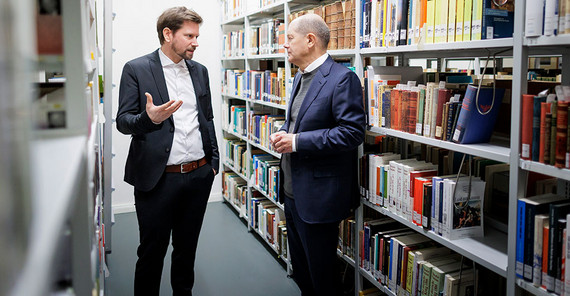Founded in 1935, the Theodor Fontane Archive preserves a substantial part of Fontane’s estate and is considered a center of international Fontane research. The German government designated it a cultural memory site of national importance in 2001. More recently, it has distinguished itself as a player in the field of digital humanities. Since 2014, the archive has been an academic institution of the Faculty of Arts at the University of Potsdam.
Mr. Scholz was extremely impressed that all of the archive’s manuscripts have already been digitized, describing it as a “great achievement.” With a view to the turning point in time dealt with in Fontane's late work “Der Stechlin” and introduced by Trilcke, the chancellor signed the archive’s guest book with the following words: “We have times of upheaval again today. Even an archive remains up to date, this one even more so.”
“Archives may sometimes have a somewhat dusty image. But in fact, literary archives are very much contemporary research and educational sites for the complexity of communication, even in the digital age,” Trilcke also emphasized. “Thus, in the Fontane Archive today, we not only decipher complex aesthetic manuscripts, but also develop digital tools for historical speech recognition or conduct research on modeling ambiguous cultural data.”
Contact: Prof. Dr. Peer Trilcke, Director of the Theodor Fontane Archive
Telephone: +49-331-20139-6
Email: peer.trilckeuuni-potsdampde
Photo: Chancellor Olaf Scholz with Archive Director Peer Trilcke (Photo: Photothek)
Media Information 03-02-2023 / No. 015

